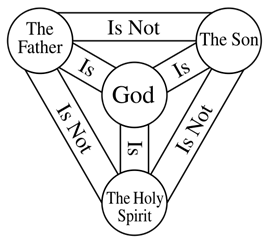Affirmations and Confessions of a Progressive Christian Layman – The Trinity

Is Christianity Monotheistic, Duo-theistic, or Polytheistic?
Orthodox Christians acknowledge one God, but they believe God is manifested in three different personifications – Father, Son, and Holy Spirit, which sounds polytheistic. I don’t think I’ve ever been in a church that worships the Holy Spirit in the same sense that they worship God and Jesus, so in that sense, many Christian churches appear to be duo-theistic. For most evangelical or fundamentalist churches, Jesus is by far the most important deity; they worship Jesus as God. If anything, God is forgotten or becomes secondary to Jesus. And the Holy Spirit is generally either considered irrelevant or ignored. So is Christianity monotheistic, duo-theistic, or polytheistic? The answer probably depends on what branch of the Christian church one attends.
Explaining the Trinity
During the fourth century, Christianity digressed from the concept of one God into the vague and mysterious doctrine of the Trinity. The Catholic Church reportedly devised the Trinitarian doctrine to answer the charge of worshipping three gods – God the Father, God the Son, and God the Holy Ghost. Trinitarianism became a part of the Roman Catholic doctrine as a result of the first ecumenical council of Nicaea in 325 CE. After Emperor Constantine embraced Christianity, he insisted that the Church adopt many changes that would make the religion more familiar to the superstitious Romans, including the deification of Jesus, the Holy Ghost, and making God polytheistic through the Trinity. Bishop Athanasius of Alexandria is credited with formulating the doctrine, although some scholars reject his authorship. It states in part:
“… we worship one God in Trinity, and Trinity in Unity; Neither confounding the Persons; nor dividing the Essence. For there is one Person of the Father; another of the Son; and another of the Holy Ghost. But the Godhead of the Father, of the Son, and of the Holy Ghost, is all one; the Glory equal, the Majesty coeternal. Such as the Father is; such is the Son; and such is the Holy Ghost. The Father uncreated; the Son uncreated; and the Holy Ghost uncreated. The Father unlimited; the Son unlimited; and the Holy Ghost unlimited. The Father eternal; the Son eternal; and the Holy Ghost eternal. And yet they are not three eternals; but one eternal. As also there are not three uncreated; nor three infinites, but one uncreated; and one infinite. So likewise the Father is Almighty; the Son Almighty; and the Holy Ghost Almighty. And yet they are not three Almighties; but one Almighty. So the Father is God; the Son is God; and the Holy Ghost is God. And yet they are not three Gods; but one God. So likewise the Father is Lord; the Son Lord; and the Holy Ghost Lord. And yet not three Lords; but one Lord. For like as we are compelled by the Christian verity; to acknowledge every Person by himself to be God and Lord; So are we forbidden by the catholic religion; to say, There are three Gods, or three Lords. The Father is made of none; neither created, nor begotten. The Son is of the Father alone; not made, nor created; but begotten. The Holy Ghost is of the Father and of the Son; neither made, nor created, nor begotten; but proceeding. So there is one Father, not three Fathers; one Son, not three Sons; one Holy Ghost, not three Holy Ghosts. And in this Trinity none is before, or after another; none is greater, or less than another. But the whole three Persons are coeternal, and coequal. So that in all things, as aforesaid; the Unity in Trinity, and the Trinity in Unity, is to be worshipped. He therefore that will be saved, let him thus think of the Trinity.”
In my opinion, that is theological gobbledegook.
Does the Bible teach the trinity? No. Neither the word “trinity,” nor the doctrine, appears in the Bible. Supporters of the concept might point to “the Great Commission” to prove its existence: “Go therefore and make disciples of all nations, baptizing them in the name of the Father, and of the Son, and of the Holy Spirit” (Matthew 18:19) or Paul’s blessing: “The grace of the Lord Jesus Christ and the love of God and the fellowship of the Holy Spirit be with you all” (2 Corinthians 13:13 ).
But other Biblical verses seem to defeat the concept: the Jewish Shema Yisrael: “Hear, O Israel: the Lord our God, the Lord is one” (Deuteronomy 6:4). Jesus and his Jewish followers would never have contradicted the Shema! “For there is one God; there is also one mediator between God and humankind, Christ Jesus, himself human” (1 Timothy 2:5).
If the Trinitarian doctrine is not Biblical and did not become a cornerstone of the Christian faith until the fourth century, how can it be an essential of Christianity?
Sixteen century Italian reformer, Faustus Socinus, said the doctrine of the Trinity was simply a monstrosity, an imaginary fiction that was “repugnant to reason” and actually encouraged the faithful to believe in three separate gods.
The Arian Catholic Church (or the Holy Catholic and Apostolic Church) claims the doctrine of the Trinity is a heresy and apostasy. They also contend that the early Christian Church, filled with former Jews, would not have been Trinitarian; the Jews were very monotheistic and would not have understood the concept of the trinity.
Does the Trinitarian formula define God? Of course, not! It is merely a description of the human experience of God in the language of fourth century, Greek-speaking Europe. The human mind is not capable of defining God with human words without becoming idolatrous, so how can anyone claim that God is a Trinity?
Does the Bible teach that the Holy Spirit is a person? No. Defining the trinity in terms of person is a Greek philosophical term. Thomas Jefferson wrote:
“It is too late in the day for men of sincerity to pretend they believe in the Platonic mysticism that three are one and one is three, and yet, that the one is not three, and the three not one…. But this constitutes the craft, the power, and profits of the priests. Sweep away their gossamer fabrics of fictitious religion, and they would catch no more flies.”
Jefferson continued, “The hocus-pocus phantasy (sp) of a God, like another Cerberus, with one body and three heads, had its birth and growth in the blood of thousands and thousands of martyrs.”
Catholic theologian Hans Küng observed in his book Christianity and World Religions that the Trinity is one reason why Christianity has had difficulty converting Muslims. He stated:
“Muslims simply cannot follow… the idea of the Trinity… The distinctions made by the doctrine of the Trinity between one God and three hypostases do not satisfy Muslims, who are confused, rather than enlightened, by theological terms derived from Syriac, Greek, and Latin. Muslims find it all a word game.”
Earlier in my life I accepted the Trinitarian idea without much thought. However, after thinking it through, for me, there is God and our human manifestation of God, Jesus. The spirit is God working in our lives, not a separate being. I worship one God, not three. God is God! The center of everything! The father, son, and spirit may be manifestations, revelations or aspects of God, but they are not God.
The diagram below, the “Shield of the Trinity,” is one of my favorite Trinitarian symbols:
God is in the center, as my theology attests. The three arms leading out from God go to The Father, The Son, and The Holy Spirit, and contain the word “is” (God is The Father, The Son, and The Holy Spirit), but the connections between The Father, The Son, and The Holy Spirit have the words “Is Not” in a connecting triangle (The Father is not The Son, The Son is not The Holy Spirit, etc.).
Another concept of the Trinity that I find interesting is a circle; this imagery comes from the Eastern Orthodox Church. In the seventh century, John of Damascus, a Greek theologian, used the concept of perichoresis to describe the Trinity. In Greek, peri means “around” (the origin of our word “perimeter”), and choresis means “dancing” (where our word “choreography” originated). So, according to John of Damascus’ concept, the father, son and spirit are like three dancers dancing around together in harmonious, joyful freedom.
Personally, I would prefer to add God in the center of the circle, like the previous illustration of the Trinity above.
Rejecting the Trinity
The following is a partial list of faith groups that reject the doctrine of the Trinity: Mormonism (The Church of Jesus Christ of Latter-Day Saints), Jehovah’s Witnesses, Christian Science, Philadelphia Church of God, Global Church of God, United Church of God, Oneness Pentecostals, Unification Church, Scientology and The Arian Catholic Church (or the Holy Catholic and Apostolic Church).


